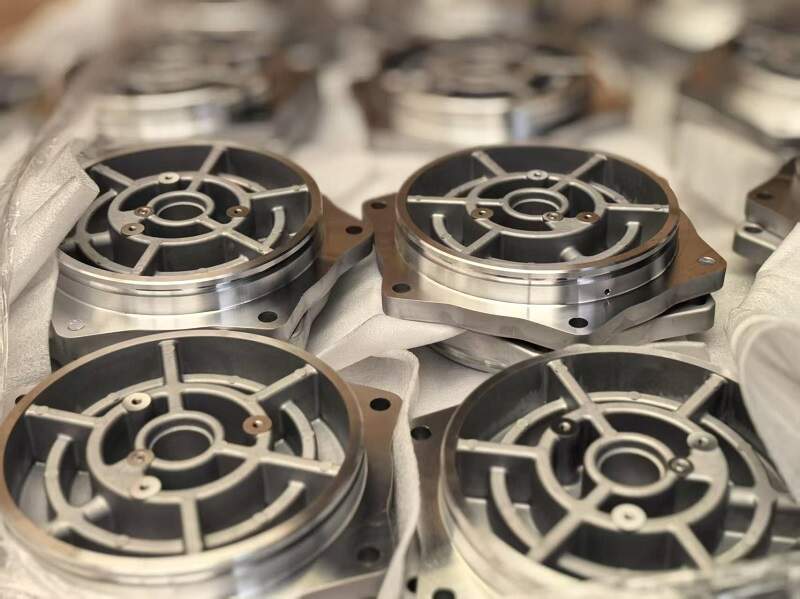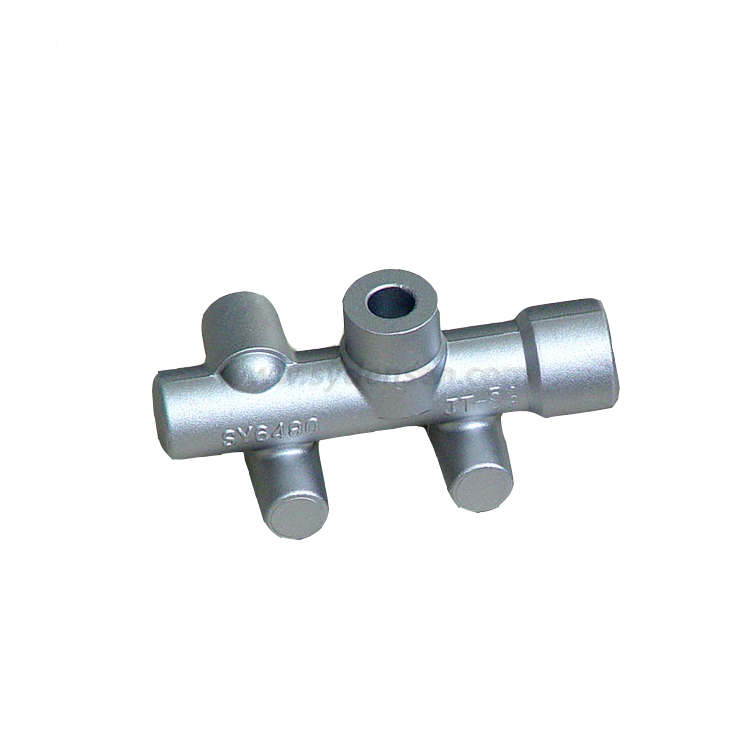Discovering the Innovative Processes Behind Modern Aluminum Foundry Workflow
Modern light weight aluminum foundry procedures are undergoing substantial transformation. Automation and AI are improving production methods, improving both effectiveness and accuracy. The assimilation of 3D printing is enhancing mold production, while sustainability methods are ending up being a lot more essential. Each of these improvements plays a vital role in redefining the industry. The effects of these modifications prolong past mere manufacturing efficiency. What possibilities and obstacles lie in advance for light weight aluminum factories in this evolving landscape?
The Role of Automation in Light Weight Aluminum Foundries

In addition, automation adds to boosted safety requirements within the shop environment. By moving harmful tasks to equipments, human employees can concentrate on managerial functions and quality assurance, lessening the danger of mishaps. On top of that, information analytics stemmed from automated procedures provide beneficial insights right into functional efficiency, leading to far better decision-making and continuous renovation. As the need for light weight aluminum items grows, the fostering of automation technologies will likely expand, better changing the landscape of aluminum shop procedures.
Developments in Casting Technologies
Current advancements in casting innovations are changing aluminum foundry operations. Innovations such as 3D printing combination, progressed alloy formulas, and automated procedure optimization are improving performance and product top quality. These growths are crucial in satisfying the advancing demands of the market.
3D Printing Assimilation
Integrating 3D printing innovation into light weight aluminum shop operations has actually reinvented traditional spreading methods, enhancing both performance and precision. This ingenious approach permits the fast manufacturing of complex molds and cores, significantly minimizing preparations and product waste. By utilizing additive production, foundries can produce complex geometries that were impossible or previously tough to accomplish with standard techniques. The adaptability of 3D printing additionally makes it possible for fast style adjustments, promoting a much more agile manufacturing procedure. In addition, this combination sustains the usage of lightweight structures, which is progressively vital in industries such as automotive and aerospace. As light weight aluminum foundries continue to adopt 3D printing, they position themselves at the center of technical development, driving improvements in item quality and functional capacities.
Advanced Alloy Formulations
The advancement of innovative alloy formulas has actually greatly improved casting innovations in aluminum shop operations. These formulations incorporate various components, such as silicon, copper, and magnesium, to enhance mechanical homes and thermal resistance. By tailoring the make-up of light weight aluminum alloys, manufacturers can attain details efficiency qualities that fulfill the demands of diverse applications, from vehicle elements to aerospace frameworks. Using innovative alloys also adds to decreased weight and raised stamina, which are essential consider modern engineering. Additionally, technologies in alloy development enable much better fluidity throughout spreading, causing improved surface area finishes and reduced flaws. In general, progressed alloy solutions stand for a substantial leap ahead, positioning aluminum foundries to meet the evolving requirements of various markets properly.
Automated Refine Optimization
Advancements in casting modern technologies have led the method for automated process enhancement in aluminum foundry operations. By integrating sophisticated software application and real-time information analytics, factories can currently streamline manufacturing procedures and boost high quality control. Automated systems keep track of variables such as temperature level, stress, and air conditioning rates, enabling immediate changes that reduce defects and waste. In addition, machine knowing algorithms assess historic performance information to forecast ideal setups, consequently enhancing effectiveness and minimizing cycle times. Robotics additionally play a significant duty, taking care of repetitive tasks that improve safety and precision. Overall, these advancements not only drive functional effectiveness but also enable shops to satisfy the growing demand for top notch light weight aluminum elements in different markets.
Smart Production and Market 4.0 Combination
The combination of Smart Production and Market 4.0 within aluminum foundries is transforming functional efficiency. By leveraging IoT modern technologies, automation, and robotics, factories can enhance manufacturing procedures and lower downtime. Furthermore, information analytics gives important understandings that enhance decision-making and drive continuous renovation.
IoT in Shop Workflow
As manufacturers increasingly accept the Web of Points (IoT), foundry procedures are experiencing a transformative shift in the direction of wise manufacturing and Sector 4.0 integration. Precision aluminum casting. IoT technologies make it possible for real-time data collection and analysis, boosting decision-making processes and functional effectiveness. Sensing units and connected gadgets keep track of tools efficiency, material use, and ecological problems, permitting positive maintenance and source optimization. This connection promotes a much more dexterous production atmosphere, where adjustments can be made promptly in reaction to market demands. In addition, IoT helps with boosted traceability and quality assurance, as information from the whole production cycle can be quickly accessed and evaluated. Generally, the assimilation of IoT in shop procedures substantially enhances efficiency and drives technology in light weight aluminum manufacturing processes
Automation and Robotics Combination
Automation and robotics integration is reinventing light weight aluminum foundry operations by enhancing efficiency and accuracy. This transformative approach streamlines processes such as molding, putting, and completing, decreasing human mistake and enhancing result consistency. By utilizing advanced robot systems, shops can attain greater production rates while maintaining rigorous quality standards. Automated systems additionally enable real-time monitoring and adaptive control, enabling quick adjustments to manufacturing criteria. On top of that, the combination of robotics decreases labor prices and minimizes safety and security threats connected with hand-operated handling of molten metal. As factories accept smart production concepts integral in Industry 4.0, the harmony between automation and robotics strengthens their competitive side, leading the way for sustainable development and advancement in the aluminum spreading sector.
Information Analytics for Efficiency
Taking advantage of information analytics greatly boosts performance within aluminum factory procedures, aligning with smart production and Industry 4.0 concepts. By leveraging real-time data collection and analysis, factories can check manufacturing processes, predict equipment failings, and optimize resource allowance. This data-driven approach helps with insightful decision-making, allowing managers to identify bottlenecks and enhance process. Additionally, anticipating analytics empowers foundries to expect market needs, thereby reducing waste and ensuring prompt product delivery. Integration of data analytics with IoT gadgets boosts operational presence, promoting a positive upkeep society. Eventually, carrying out these advanced logical methods not only increases productivity but additionally drives advancement, placing aluminum shops to satisfy the developing demands of the sector while maintaining one-upmanships in a quickly transforming landscape.
Lasting Practices in Aluminum Spreading
While the light weight aluminum spreading market has actually traditionally encountered ecological obstacles, many foundries are now adopting lasting practices to reduce their influence (aluminum casting). A significant focus has been on recycling light weight aluminum scrap, which not only lowers waste however likewise conserves energy contrasted to key light weight aluminum production. Ingenious melting innovations, such as induction furnaces, boost energy performance and lower greenhouse gas discharges
Furthermore, shops are executing closed-loop water systems to lessen water intake and lower thermal pollution. The use of environment-friendly binders in mold-making processes is gaining grip, further decreasing dangerous emissions.
Furthermore, some centers are purchasing renewable resource resources to power procedures, aligning with global sustainability objectives. By incorporating these methods, the aluminum casting industry is developing towards an extra environmentally liable future, demonstrating read the article that financial growth can exist together with environmental stewardship - Aluminum Foundry. These initiatives mirror a dedication to sustainability and the relevance of environmental responsibility in production
Quality Assurance Innovations
As the aluminum casting sector advancements in the direction of sustainability, the significance of top quality control developments comes to be significantly noticeable. Modern aluminum shops are adopting innovative modern technologies to boost their quality control procedures. Strategies such as real-time tracking and data analytics enable click here to find out more suppliers to spot variances and problems early in the manufacturing cycle. Applying computerized examination systems outfitted with maker discovering algorithms assurances that items satisfy strict top quality requirements while decreasing human error.
In addition, the integration of non-destructive screening methods, such as radiographic and ultrasonic assessments, offers deeper insights right into the stability of spreadings without harming the material. These technologies not just boost item integrity however likewise reduce waste, lining up with sustainability objectives. Furthermore, the adoption of standard high quality frameworks aids enhance procedures throughout different shops, guaranteeing uniformity in output. Collectively, these innovations are reshaping quality assurance, promoting a culture of quality within the light weight aluminum casting sector.
Future Fads in Light Weight Aluminum Factory Workflow
What advancements exist ahead for aluminum factory operations? The future of light weight aluminum factories is poised for improvement through innovations in automation, fabricated knowledge, and sustainable practices. The combination of robotics and automated systems is expected to boost efficiency and accuracy in the casting procedures, lowering human error and labor costs. Furthermore, AI-driven analytics will enable real-time tracking and anticipating upkeep, enhancing operational performance and decreasing downtime.
Sustainability stays a centerpiece, with shops significantly taking on green methods, such as making use of recycled aluminum and creating low-emission melting modern technologies. Advancements in 3D printing are additionally anticipated to revolutionize mold-making, allowing for complex geometries and decreased product waste. As the sector embraces digitalization, data-driven decision-making will come to be critical, enabling shops to respond quickly to market needs. Collectively, these trends promise to redefine aluminum foundry procedures, making them extra efficient, sustainable, and adaptable to future difficulties.

Frequently Asked Questions
What Precaution Are Executed in Light Weight Aluminum Factory Operations?
Aluminum shop operations implement numerous safety and security actions, including personal safety devices, air flow systems to manage fumes, routine security training, emergency reaction strategies, and rigid monitoring of temperature and equipment to stop accidents and warranty worker safety.
How Do Shops Take Care Of Workforce Training for New Technologies?

What Products Are Commonly Recycled in Aluminum Foundries?
Light weight aluminum factories commonly reuse scrap aluminum, consisting of post-consumer products like beverage canisters, automobile parts, and construction materials. This reusing process decreases waste and saves sources, adding to an extra lasting light weight aluminum manufacturing sector.
Just How Does Light Weight Aluminum Spreading Influence the Atmosphere?
Light weight aluminum casting influences the atmosphere through energy-intensive processes, greenhouse gas discharges, and prospective local air pollution. Nonetheless, innovations in recycling and lasting practices can reduce these results, advertising a much more green approach to aluminum manufacturing.
What Are the Typical Lead Times for Aluminum Casting Projects?
Normal preparation for light weight aluminum spreading jobs vary considerably, typically varying from 2 to 6 weeks. Elements affecting these timelines consist of complexity, order size, and product schedule, impacting overall manufacturing routines in foundry operations.
Automation increasingly plays a crucial duty in aluminum foundries, boosting efficiency and accuracy in the production process. Developments in casting technologies have actually paved the method for automated procedure enhancement in aluminum foundry procedures. Utilizing information analytics greatly enhances performance within light weight aluminum foundry operations, lining up with clever manufacturing and Sector 4.0 principles. A significant emphasis has been on recycling light weight aluminum scrap, which not only decreases waste but likewise saves energy compared to primary light weight aluminum production. Aluminum factories frequently recycle scrap light weight aluminum, including post-consumer items like beverage canisters, automotive This Site components, and building and construction materials.